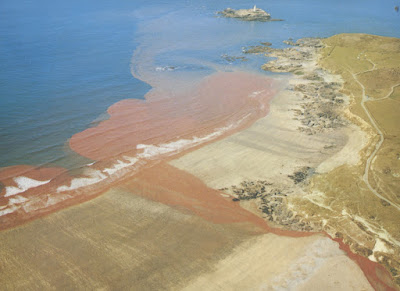MEI's Sustainable Minerals '21 ended on Thursday afternoon, after four days of excellent presentations to 105 participants from 17 countries. It would have been great to have been able to get together each evening, but sadly this is not a feature of today's online conferences, so it was really nice to stroll down to Falmouth's Gyllyngvase beach at the end of the 4th day to catch up with around 30 participants for this month's Cornish Mining Sundowner. Originally scheduled for the Chain Locker pub in Falmouth, due to rising Coronavirus infections the lifting of restrictions on June 21st was postponed for a further 4 weeks, but fortunately we were blessed with a beautiful warm evening on the beach.
Joining the regulars were three representatives from the Welsh company Maelgwyn Mineral Services (MMS), sponsors of MEI's next conference, Flotation '21. It was great to catch up with Steve Flatman and Tim Sandbrook and new recruit James Marsden.
 |
| With Steve, James and Tim |
MMS were here to pursue their interests in mining developments down in Cornwall, and there has been much going on this month.
Cornish Lithium Ltd is a highly innovative mineral exploration and development company focused on the environmentally-sustainable extraction of lithium from geothermal waters and hard rock in the historic mining district of Cornwall. The company has had much exposure recently in the mainstream media, including the National Geographic Magazine, and has been featured in an excellent video explaining simply why Cornwall has these rich geothermal waters and the approach being adopted to extract the lithium.
Last Monday the company announced that it had successfully completed its latest crowdfunding campaign, raising £6 million in only 20 minutes! The Company has secured agreements with owners of mineral rights over a large area of the county and is using modern technology to re-evaluate the region’s potential for low carbon extraction of lithium and other vital technology metals such as tin, copper and cobalt. A secure domestic supply of such metals is considered vital to the industrial strategy of the UK as it moves towards the production of electric vehicles and a net zero carbon future. Current work is focusing on how best to extract the lithium from the brines. A decision on processing is imminent, and it’s expected that a pilot plant will be ready by the end of March next year.
Simultaneously the company is working to optimise the extraction of lithium from mica minerals, in collaboration with Comminution '22 sponsor Grinding Solutions, and this month announced the formation of a consortium involving Cornish Lithium, Imerys Minerals Ltd and sustainable manufacturing innovation consultancy HSSMI, to assess the potential for co-production of lithium and kaolin (china clay) in Cornwall. The project will assess the potential to produce lithium from waste material produced from both current and historic kaolin operations.
The project consortium aims to evaluate the economic viability of extracting lithium from zinnwaldite, a lithium containing mica, found in the decomposed granite which also contains kaolin. This could increase the resource efficiency of the mined rock, with the double benefit of making the Cornish kaolin industry even more competitive in international markets, as well as contributing to securing a domestic supply of lithium that is vital to the UK’s transition to renewable energy and a zero-carbon economy.
Kaolin was first discovered in Cornwall in 1746. Since then, Imerys developed to become one of the world’s largest producers of kaolin. Today it employs more than 750 people in east Cornwall, 1100 people in the UK and contributes over £220 million sales per year to the British economy. Imerys supplies, from its Cornish mining and industrial footprint, a large number of growing applications worldwide such as paints, coatings, plastics, ceramics, rubber, pharmaceuticals and cosmetics.
It was great to have Cornish Lithium CEO Jeremy Wrathall with us last evening, together with Chairman Derek Linfield and Corporate Development Manager Neil Elliott, and they were joined in the photo below by Richard Williams, CEO of Cornish Metals Inc.
 |
| Derek, Neil, Jeremy and Richard |
Early this month Cornish Metals announced an updated resource estimate for its South Crofty tin-copper project in Cornwall, showing that is is richer than anticipated, as it moves closer to reopening the past producing mine. The Canadian miner, formerly known as Strongbow Exploration, said additional sampling showed a 10% increase in indicated resources to 2.08 million tonnes in both the lower mine and upper mine areas.
The Vancouver-based company is working on re-opening the South Crofty mine, which was closed in 1998 following more than 400 years of almost continuous production.
“As the UK moves towards net zero, Cornwall will be at the heart of the extraction of high-technology metals, growing our economy and establishing a secure and responsible UK supply chain,” said Darryn Quayle, mining specialist at the international trade department.
“At our South Crofty site we’re primarily focused on tin – the forgotten foot soldier of the high-tech world – which is used in absolutely everything that we need for our modern lives, from mobile phones, robotics and computing to power generation and storage,” said Owen Mihalop, Cornish Metals' chief operating officer. High demand for consumer electronics and issues shipping metal out of Asia have created a shortage of tin, pushing prices for the metal near records for the first time in a decade.















































